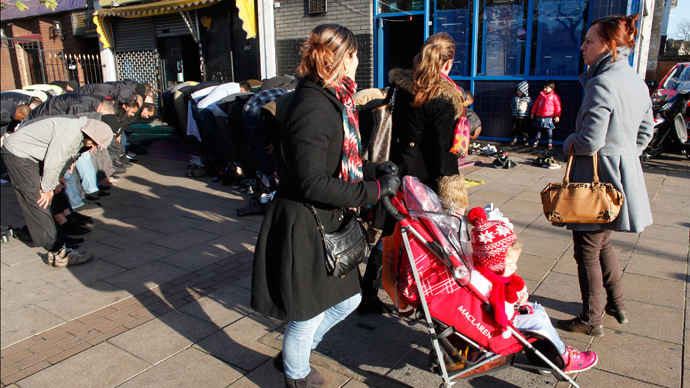White British to continue moving out of 'colored' areas

It's not racism but feeling uncomfortable spurring the white British to move out of diverse ethnic areas. Eric Kaufmann Professor of Politics at London University, told RT the UK government must strike a balance if its multiculturalism policy is to work.
The recent study, from the UK-based Demos think tank and Birkbeck College,London University, found out that 100,000 ethnic minority people had left London for diverse, mixed-minority parts of England and Wales between 2001 and 2011. Conversely, around 600,000 white British people left London for other parts of England and Wales – often choosing homogeneous districts which are over 90 percent white.
RT:The study says that this trend is not fueled by overt racism, what drives it then?
Eric Kaufmann: The phrase “white flight” is often used when you have a white majority population, and if it thinks that the population is too diverse, and it decides it's not comfortable and you start to see people moving. And of course as they move there are fewer whites that feel less comfortable and that’s a spiral. That is what happened in the US in the 1950s. But I don’t think it happens here. Why? The research that we have done is based on the so-called ONS study which tracks people and how they move, and shows that people who do move don’t differ from the people who remain behind in terms of who they support in terms of their political party, in terms of their attitude to race, immigration, etc. Based on that we can say that it’s white liberals and white conservatives that are moving away to wider areas. If it were just conservative whites we could say those people don’t like diversity, that’s why they are leaving.
RT:Do you think this trend can have certain implications, such as that multiculturalism has failed in the UK?
EK: I think, if you are in favor of multiculturalism, you can say: “There is no problem because there are a lot of cultures mixing rather than sticking to their ghetto”. In this sense it’s not a comment on multiculturalism, there is a problem, however, in an ethnic majority that has difficulty with seeing itself reflected into multiculturalism. So the ethnic majority is just uncomfortable living as just one of a bunch of cultures in the area. For a lot of people, particularly when they have got children, they’d like to move to the white area where they feel more comfortable. It does seem as though the ethnic majority has a slightly different view of the optimal share. They want to be perhaps in the majority, whereas many ethnic minorities might be content to be a minority because after all it’s been their experience. I think this is a slight issue there for multiculturalism in it: how does it address this issue, different perceptions between the majority and minority.

RT:In your opinion, should the government take any measures to ensure that minorities are integrated into society?
EK: I don’t think they need much to do about minorities, because minorities, as I said, are moving out and they are leaving their areas of concentration. I think the government policy issue might be one of how do we retain or encourage white British people to remain in some of these inner-suburban areas. Perhaps looking at housing policy, at schooling; so if you design a school catchment, assuming you can do that, it may be the case why British people leave when it gets below 50/50 white British and other, while the minorities might be content at 25% minorities, 75%-white or even less. Just some sensitivity to what are the tipping points for the ethnic majority might make sense in housing policies, schooling policy etc.
RT:How will the picture change in coming years?
EK: I think we are going to see the continuation of a shift out, in a sense that white British would continue to leave diverse areas. London would continue to become more diverse, for example, but also other cities. I think that trend is pretty well established. The issue is whether these areas can retain a white British population. If you look at the US that is more diverse than Britain, there are cities that have large areas that have very few white. It is talked about as a public policy issue in terms of integration and upward mobility for the minority groups, so that's just something that I think the government needs to be cognizant of.
The statements, views and opinions expressed in this column are solely those of the author and do not necessarily represent those of RT.
The statements, views and opinions expressed in this column are solely those of the author and do not necessarily represent those of RT.












